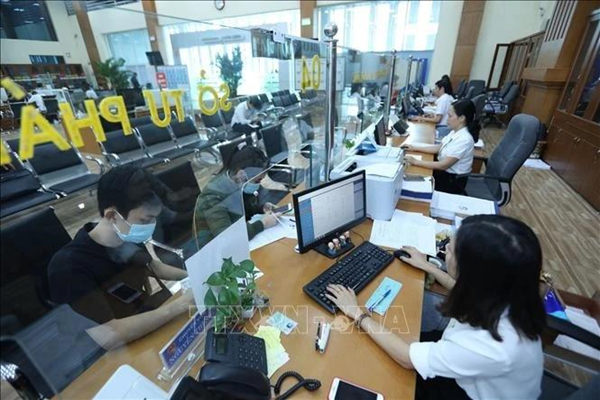 Society
Society

 |
| Tuyết Vũ, advisor, investor, and entrepreneur. Photo Courtesy of Tuyết Vũ |
Tuyết Vũ, a seasoned advisor, investor, and entrepreneur deeply embedded in Việt Nam’s and the global innovation ecosystem, shares with Việt Nam News her insights on the country’s digital transformation journey. Drawing from her extensive experience across both the private and public sectors—serving as a Senior Advisor to Việt Nam's Minister of Planning and Investment and currently as a Senior Advisor at Vertex Ventures SEA & India—she offers valuable lessons for businesses and the government alike in fostering innovation and advancing Việt Nam’s tech ecosystem.
In your view, what are the biggest challenges Việt Nam faces in adopting digital transformation and developing high-tech industries? Conversely, what are the most promising opportunities for tech investors and founders?
Việt Nam has a strong foundation for high-tech investment. With its robust STEM education system, the country has, over the past few decades, produced generations of high-quality engineering graduates, some of whom have reached world-class standards. However, as a high-tech investment market, Việt Nam is still in an early, nascent stage. There are challenges inherent in the market's structure and readiness that can hinder digital transformation and the development of high-tech industries.
First, let’s address digital transformation. We need the right mindset on digital transformation. It is not just about buying technology and certain software. Digital transformation involves the entire operation of an organisation, with technology and software as just one component. It begins with the willingness to adopt technology, followed by designing the organisation and processes to align with new operational standards, and finally integrating the technology into daily operations effectively. Moreover, selecting the right technology is critical. Organisations must invest in products that position them ahead of the curve rather than outdated software with limited scalability.
Second, in developing high-tech industries, we need strong clusters of technology players within a comprehensive ecosystem. Lessons from the historical development of high-tech industries in various countries show that an ecosystem approach offers the greatest chance of success. Diversity within the ecosystem is crucial—it must include a mix of industry-leading companies alongside budding startups. Additionally, co-locating companies in a geographical area with a supporting supply chain is equally important. A successful high-tech ecosystem functions like a mini-city, with a blend of amenities and workspaces that allow high-tech professionals to work and live efficiently. This approach has been key to the success of tech hubs worldwide, from China and Taiwan to Korea, France, and Dubai, proving success outside of the Silicon Valley.
Third, for the high-tech sector to grow, there must be a willingness and an environment conducive to experimentation. This requires support systems, including physical infrastructure like labs and workshops, financial infrastructure such as venture capital and non-dilutive financing, and intellectual infrastructure like research facilities and robust IP protection.
Above all, intellectual integrity is paramount. In a borderless high-tech industry, competitiveness relies on genuine intellectual contributions. Only with intellectual integrity in research and development can we create competitive IPs to position ourselves at the forefront of innovation.
The world is evolving rapidly, and opportunities emerge daily. As venture capitalists, our role is to continually track and evaluate global developments, seeking opportunities that transcend the obvious. I encourage scientists, engineers, and prospective founders eager to create transformative companies to connect with us and begin the conversation.
From an investor's perspective, how do Việt Nam’s policies and business environment impact the decision-making process? What specific improvements could Việt Nam make to address challenges and better support investment and innovation?
I operate in a specific asset class where investment decisions hinge on two critical questions: "What is new?" and "How significant is it?" Policies and incentives that stimulate new inventions—whether in technology, products, or business models—are crucial for attracting investors in this space.
For technological innovation, creating high-tech clusters and fostering an environment for intellectual discovery are vital. Unique IPs with global applicability are particularly valuable. However, from an investment standpoint, IP alone isn’t enough. Unless the IP has the potential to revolutionise industries—such as pharmaceuticals or ultra-high-tech innovations typically led by world-class researchers or Nobel laureates—investors will also consider commercial viability before committing.
There’s a growing perspective that business model innovation is increasingly critical in the high-tech sector. This is where IP ownership is combined with a strong go-to-market strategy to capture market share. Examples like DJI, which dominates over 50 per cent of the global drone market, highlight this point. While DJI has proprietary IP, its success also hinges on a strong supply base, manufacturing expertise, and effective market strategies, amongst other things. A solid business model behind robust IP is an important factor for investors.
For Việt Nam, it’s never too late to encourage startups in this space, supported by systems like venture capital, research labs, supply chains, and academic institutions. There are numerous global case studies that Việt Nam can learn from to accelerate its high-tech industry while avoiding common pitfalls.
As a venture capitalist, what do you consider the most critical factors for building and growing a successful high-tech company in Việt Nam?
If the measure of success in 5–10 years is for a high-tech company born in Việt Nam to make a global impact by commanding a significant market share, then several layers need to be considered.
First, before focusing on high-tech, it’s essential to think of it as a company. Building high-quality, globally competitive companies should be the starting point. As noted, this sector thrives on global competition, and success is measured by global standards. Strong governance, robust performance, and solid business foundations are non-negotiable metrics for such aspirations.
Second, in a fast-evolving space, the ability to think strategically about the global market is crucial. This involves understanding market shifts, identifying opportunities, addressing existing needs, and fostering technological innovation. The rapid rise of generative AI over the past two years has disrupted even established global unicorns and decacorns, underscoring the need to stay ahead of the curve. Complacency is not an option; constant vigilance and readiness to compete at the highest level are imperative.
Third, the focus must be on the product. It’s important not to conflate having engineering talent with having the ability to create impactful technology companies. A strong engineering workforce alone does not guarantee success. A true product mindset involves building beyond mere coding—it’s about creating value-driven, innovative solutions that resonate with global markets.
Fourth, it’s about the ecosystem. Each company is an ecosystem by itself. But it’s critical to not confuse having an ecosystem and “having an ecosystem”. Partnerships are crucial - and a company can be big without having everything in house. Mapping out the partnership network required for a company to thrive and marking out the boundary of where to inhouse and where to partner is important. Building everything in house kills the company and risks its resources spreading too thin that it can’t do anything at world-class level. Partnering on everything risks the company of not having anything of substantial value under its ownership. This is an art by itself.
Finally, all of the above hinges on people. The right individuals—those with world-class capabilities, forward-thinking mindsets, relevant experiences, expansive networks, and unwavering drive—are at the core of any successful venture. This is why founders and founding teams remain central to the investment decisions of early stage venture capitalists worldwide.
From your perspective, how does the current state of STEM education and digital skills training in Việt Nam impact the talent pool for startups and high-tech companies? What improvements would you suggest to strengthen Việt Nam’s workforce and support its growing innovation ecosystem?
Việt Nam is fortunate to have a strong STEM education system, which is a rare asset not easily found in many other countries. The government’s vision to promote STEM education and advance science and technology is very encouraging for the investor community in this sector.
However, what I see missing is an innovative mindset. We need to encourage more young people to try building or working for startups—even though the failure rate is high. Without trying, success is not achievable. This is the nature of entrepreneurship and innovation. Developing a mindset that embraces experimentation is essential, not just for scientific discovery but also for fostering innovative companies.
Additionally, we need more training for our engineering talent pool to develop business and product mindsets. Encouraging engineers to learn beyond STEM and include subjects like humanities and social sciences is important. Not all of them will become founders—nor should they—but this kind of training provides fresh perspectives and new ways of problem-solving. It is critical to have more innovative thinkers and doers, whether they are creating their own companies or working within existing ones.
Based on your personal experience working with tech companies and innovation projects, what valuable lessons have you learned that could benefit both firms and the government in fostering innovation and driving the growth of Việt Nam’s tech ecosystem?
Việt Nam is in an exciting position right now, with multiple supportive factors creating a favourable environment for its innovation ecosystem to thrive. The key now is to systematically take advantage of these opportunities.
In my career, I’ve had the chance to meet many unicorn and decacorn founders, as well as leaders of global multi-billion-dollar early-stage investment funds. I’ve also studied dozens of world-class innovation hubs across the globe, and I’ve noticed a few common threads:
First, there is always a strong drive for something beyond materialistic gains. Of course, financial metrics are important, but they are not the only nor the most critical measure of success. A deeper drive for a greater purpose often propels these leaders to achieve global success. I think it is crucial for both government and business leaders to articulate their “why” clearly and authentically. The Vietnamese government has done an excellent job of establishing “The Era of Việt Nam’s Rise,” but firms also need to define their unique purposes in alignment with their DNA.
Second, talent attraction is everything. As I mentioned earlier, it’s all about people. For the ecosystem to truly thrive, we need to look beyond just tech talent. Great companies are built by a diverse range of people—those skilled in product design, business, finance, operations, marketing, and more. Many tech companies fail because they focus solely on technology without considering other critical aspects. Successful high-tech companies pair strong technical foundations with robust go-to-market strategies. For example, one of the successful IPOs in healthcare in 2024 involved a Nobel Prize winner working alongside a venture capitalist. Even with a world-class scientist at the helm, the business expertise was essential for the company to succeed. Attracting top talent requires having a clear and compelling purpose that draws people towards world-class achievements.
Third, a strong global ecosystem is essential. Today, global collaboration is not optional—it is necessary. This is especially true in the high-tech sector. The Vietnamese government’s efforts to foster international diplomacy in science, technology, and innovation hubs are critical for establishing Việt Nam as a global innovation hub. Companies should also prioritise creating and executing partnership strategies to stay aligned with global trends and remain competitive on the international stage. VNS




